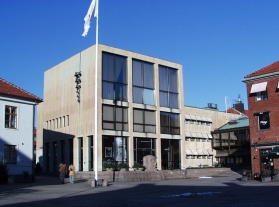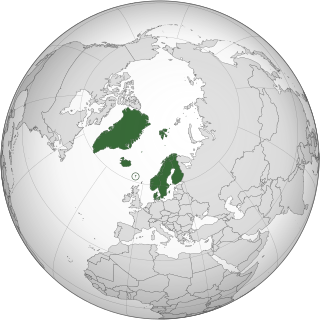
Scandinavia is a subregion of Northern Europe, with strong historical, cultural, and linguistic ties between its constituent peoples. Scandinavia most commonly refers to Denmark, Norway, and Sweden. It can sometimes also refer to the Scandinavian Peninsula. In English usage, Scandinavia is sometimes used as a synonym for Nordic countries. Iceland and the Faroe Islands are sometimes included in Scandinavia for their ethnolinguistic relations with Sweden, Norway and Denmark. While Finland differs from other Nordic countries in this respect, some authors call it Scandinavian due to its economic and cultural similarities.

The demography of Sweden is monitored by the Statistiska centralbyrån. Sweden's population was 10,538,026, making it the 15th-most populous country in Europe after Czech Republic, the 10th-most populous member state of the European Union, and the 87th-most populous country in the world. The total fertility rate was rated at 1.66 in 2020, which is far below the replacement rate of 2.1.

Karlskoga Municipality is a municipality in Örebro County in central Sweden. Its seat is located in the city of Karlskoga. Other localities include Valåsen och Labbsand, Kortfors, Linnebäck and Villingsberg.

Huddinge Municipality is a municipality in Stockholm County, east central Sweden. Its seat is located in Huddinge, which is a part of Stockholm urban area.

Vänersborg Municipality is a municipality in Västra Götaland County in western Sweden. Its seat is located in the city of Vänersborg.

Falkenberg Municipality is a municipality in Halland County on the Swedish west coast. The town Falkenberg is the municipal seat.

Vimmerby Municipality is a municipality in Kalmar County, south-eastern Sweden. Its seat is located in the city of Vimmerby.

Örebro Municipality is a municipality in Örebro County in central Sweden. Its seat is located in the city of Örebro.

Karlstad Municipality is a municipality in Värmland County in west central Sweden. Its seat is located in the city of Karlstad.

The northern region of Europe has several definitions. A restrictive definition may describe Northern Europe as being roughly north of the southern coast of the Baltic Sea, which is about 54°N, or may be based on other geographical factors such as climate and ecology.

Lempäälä (Finnish:[ˈlempæːlæ] is a municipality in the Pirkanmaa region of Finland with 24,703 inhabitants. Lempäälä is located south of the city of Tampere. The municipality covers an area of 307.06 square kilometres of which 37.51 km2 is water. The population density is 91.64 inhabitants per square kilometre.

Kauhava is a town and municipality of Finland. It is part of the Southern Ostrobothnia region, 400 kilometres (250 mi) northwest of Helsinki and by the main railway from Helsinki to Oulu. The town has a population of 15,164 and covers an area of 1,328.09 square kilometres (512.78 sq mi) of which 14.63 km2 (5.65 sq mi) is water. The population density is 11.54 inhabitants per square kilometre (29.9/sq mi).
An urban area or tätort in Sweden has a minimum of 200 inhabitants and may be a city, town or larger village. It is a purely statistical concept, not defined by any municipal or county boundaries. Larger urban areas synonymous with cities or towns for statistical purposes have a minimum of 10,000 inhabitants. The same statistical definition is also used for urban areas in the other Nordic countries.

The Nordic Passport Union allows citizens of the Nordic countries – Iceland, Denmark, Norway, Sweden, and Finland – to travel and reside in another Nordic country without any travel documentation or a residence permit. Since 25 March 2001, all five states are also in the Schengen Area.

Kristianstad Municipality is a municipality in Skåne County in southernmost Sweden. Its seat is located in the city Kristianstad.

The Nordic countries are a geographical and cultural region in Northern Europe and the North Atlantic. It includes the sovereign states of Denmark, Finland, Iceland, Norway and Sweden; the autonomous territories of the Faroe Islands and Greenland; and the autonomous region of Åland.
An urban area in the Nordic countries, with the exception of Iceland, is defined as a distinct statistical concept used to differentiate population clusters independent of municipal borders. The population is measured on a national level, independently by each country's statistical bureau. Statistics Sweden uses the term tätort, Statistics Finland also uses tätort in Swedish and taajama in Finnish, Statistics Denmark uses byområde (city), while Statistics Norway uses tettsted.














